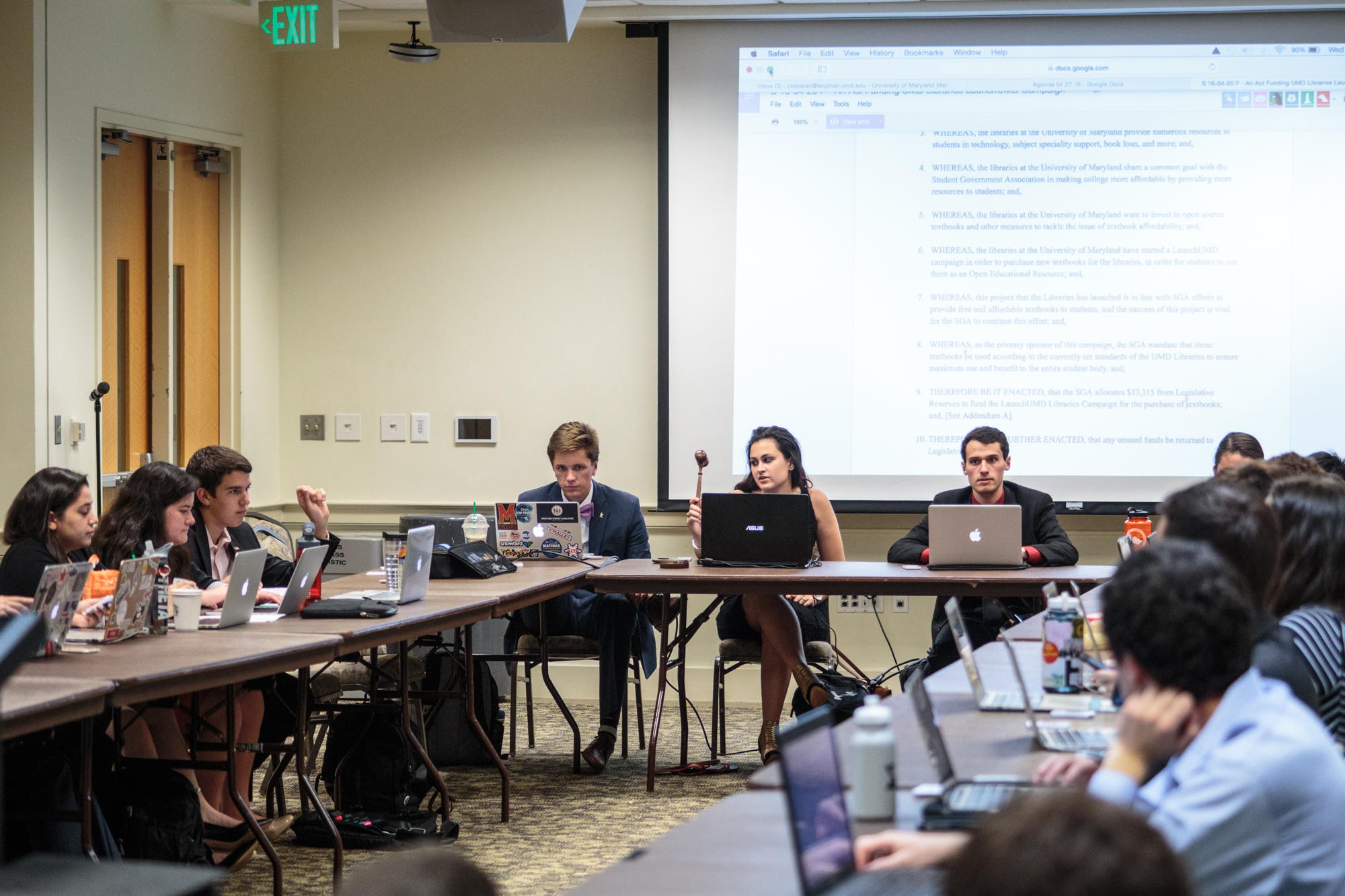By Lexie Schapitl and Samantha Reilly
The SGA voted to reorganize its executive branch, amend its student group recognition process and establish committees on technology and sexual misconduct prevention in its annual omnibus meeting Wednesday.
There was a 21-0 vote to approve the package of amendments after the Student Government Association debated the individual provisions.
At the end of each school year, the SGA looks internally at its bylaws and general structure to determine how the organization can function better, outgoing SGA President Patrick Ronk said Tuesday.
This year’s changes are aimed to increase efficiency and improve internal communication within the SGA, he added.
NEW COMMITTEES
The SGA voted to create a committee on sexual misconduct prevention after debating whether the body should stand alone or exist as a subcommittee.
Leonardtown representative A.J. Pruitt, who proposed this amendment, said this committee will be responsible for actively engaging with the student body on the issue of sexual violence prevention. The recent SGA election campaign reaffirmed student concern about the issue on the campus, Pruitt said.
Outgoing speaker of the legislature Aiden Galloway said sexual assault is “rampant” on college campuses and noted it is important to have a body looking into the issue. However, the issue would be better served by a subcommittee working in tandem with the academic affairs or health and wellness committee, she said.
Pruitt said he “would love to be able to disassemble a committee…if we get to a point where this is not an issue on campus.”
SGA president-elect Katherine Swanson said it would “be kind of an insult to the community at large” to designate the issue to a subcommittee.
The SGA similarly voted to establish a director of technology position that will work with the Division of Information Technology and facilitate student technology-related initiatives. The director will also work to organize and manage SGA websites.
The organization first considered creating a deputy director of technology position under the director of communications instead, but engineering representative Adam Hemmeter, a freshman engineering major, said this classification could discourage STEM majors from applying, adding that the tasks this committee will tackle would “transcend” communications.
This year, the SGA worked on technology-related initiatives to create an online syllabi database, restructured the dining services nutritional information website and improved Wi-Fi service on the campus.
“This technology committee would do things for everybody in the SGA,” Swanson said. “This is something that is for every committee on the SGA.”
STUDENT GROUP RECOGNITION AND FUNDING
The SGA approved a change to the student group recognition process that will allow the organization to set application deadlines no later than one week prior to the finance monthly allocation deadline.
Currently, there is no set deadline for student groups to apply for SGA recognition, which can make it difficult for the finance committee to process funding requests in time, said Sarah Niezelski, outgoing SGA vice president of financial affairs.
This change will help ensure that student groups can be recognized by the organization in time to receive funding, said Samantha Levy, the outgoing SGA director of student groups.
“The finance committee needs to know which groups are and are not recognized before we start our process of deliberations,” Niezelski said. “This change enables that to happen.”
EXECUTIVE BRANCH
Changes to the bylaws also reorganized the executive branch so that cabinet positions will be housed under a vice president to create a clearer chain of command, Ronk said Tuesday. All cabinet directors currently answer to the SGA president and chief of staff, without a great mechanism for feedback, he said.
The president will still make personnel decisions, but the restructuring provides a closer manager for cabinet directors, Ronk said. Directors of governmental and city affairs will remain under the president.
The change will allow directors to plan their initiatives more efficiently and ensure that the SGA is seeing plans through.
“Right now, we don’t have a great structure,” Ronk said. “We’re creating a much more rigid hierarchy to kind of hold people more accountable.”
In addition, the SGA director of shared governance will now focus more specifically on work with the University Senate, Residence Hall Association and Greek life communities. The SGA also voted to eliminate the shared governance committee.



